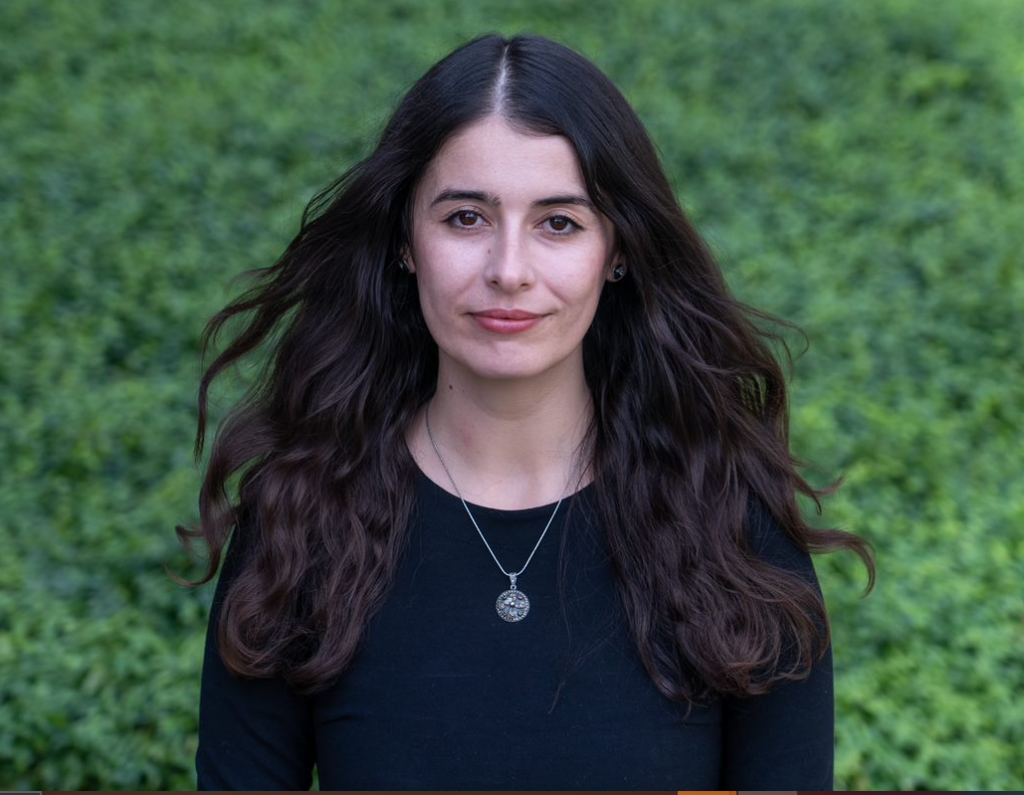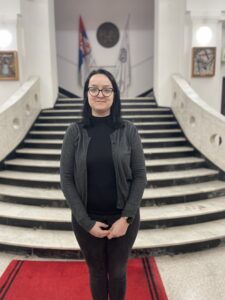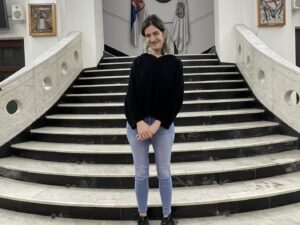Interview Ioana Dobrescu during EJWP journey, Water Footprint Implementation, The Netherlands
April 2021
I’m Romanian but have been living in the Netherlands for more than a decade, having initially come here for my studies. I hold a bachelor’s and master’s in environmental sciences and began working in the water sector after my theses and my internship on water topics. My work revolved a lot around water technology, up until I joined the Water Footprint Implementation organization. I’m now taking a much broader angle, working among other things, on shifting people’s perception of water consumption by quantifying and raising awareness of the water ‘hidden’ in the products we use every day.
I found out about EJWP through Wetskills, where I’ve been a program officer for the last three years. I like the diversity of working with people from all over Europe who can bring their perspectives into my work. It’s one thing to learn about the European water sector from reports, and it’s quite another to work with people from around Europe in an environment that facilitates honest exchanges of opinions.
Besides the network of participants that covers all corners of Europe, EJWP also facilitates interaction between early career and advanced water sector professionals. For example, one of the recent EJWP Ambassadors is Veronica Manfredi, DG Quality of Life at the European Commission. Having a direct connection with an official at the European Commission who is supportive of and willing to contribute to the development of early career professionals is very valuable. In addition, the projects we work on with the group are covering topics outside of my daily work, giving me the opportunity to learn about other niches and interconnected fields.
The Valuing Water project, proposed by Water Europe, speaks to me the most so far. We were asked to come up with new narratives for valuing water, using our creativity, a skill that will be more in demand in the near future as digital and AI are taking over a lot of predictable tasks. By developing these new narratives, we are attempting to go beyond the current perceptions of economic, cultural or environmental values and ultimately lead to changes in societal awareness, policy making and governance of water resources.
To be a water sector leader, you need not only local or regional knowledge, but also a strong connection with the sector globally. EJWP provides a broader working view of the actors, challenges and innovations of the European water sector. In an increasingly multicultural and shifting world, EJWP creates an enabling environment for early career professionals to develop beyond the tasks of their daily jobs, to work on cross-sectoral issues from a diversity-is-strength approach.
An area of possible change in the EJWP programme would be in the project selection. Most participants have different backgrounds and work in specific niches that don’t overlap. This is both a source of strength and frustration when working on projects. Ideally, the organizations proposing the projects would take into consideration the professional backgrounds, cultural diversity and geographic spread of the participants and submit broader scope topics that put collaboration at the forefront.
With the range of both low-tech and high-tech solutions available over the past decades, it is surprising how billions of people worldwide still lack access to clean drinking water and adequate sanitation. I don’t accept the simplistic answer that the biggest barrier to achieving SDG6 is lack of financing. I believe the core of the problem lies in improper governance. We’re currently not lacking the technologies, but we lack the international political will to prioritize investments and to equitably distribute technologies. As a humanity, we have failed to put in place honest and efficient governance systems, be they state, market or otherwise. I believe it’s of paramount importance that we work with the younger generations to create more honest and caring leaders for the water sector and our future as a whole.
EJWP is especially valuable in that it offers a safe environment to discuss and jointly analyse issues that we’re facing as professionals, both in terms of personal development and sector-specific challenges. For example, some of us may find it difficult to network at events or communicate efficiently with colleagues. This is addressed in personal development trainings, sometimes through role-play, which makes it both a safe and fun method of overcoming fears and developing soft skills.
Both water quantity and water quality are issues of growing concern and will unfortunately continue to be so if we keep to business as usual. ‘Day Zero’ scenarios are popping up in more and more cities and regions around the world, from Cape Town to California, Sao Paulo and Chennai. In Europe, we don’t realize how reliant we are on freshwater resources from other parts of the world, sometimes precisely from water scarce regions. In water footprint terms, Europe has externalized its water use by importing water intensive products such as coffee, cocoa and cotton from other parts of the world and exporting added value products that require little local water to produce.
Most EJWP projects take climate change effects into consideration in the devising of solutions. One example is a project on the water footprint of wine production in Europe. Currently few vineyards are using irrigation, but with prolonged droughts in the south, this is likely to change in the future. We were also investigating if this already has an impact on grape growing and if we foresee an increase in the water footprint of European wine.
Already before the completion of its first two-year EJWP group, we can clearly see the value of a programme dedicated to the development of early career professionals. We need to be able to connect through initiatives like EJWP to understand and learn from each other’s experience. There isn’t a one size fits all approach to water management. EJWP enables early career professionals to develop a broader and more thorough understanding of the water sector and a close network of fellow professionals.
Introduction at start of EJWP
June 2019
I have a background in Environmental Sciences with an MSc in Nature Conservation. I have done both my Bachelor’s and my Master’s theses on water ecology and ended up falling in love with the many aspects of water.
For the past seven years I have been working in the water sector supporting knowledge and technology exchange and bridging networks between Romania and the Netherlands. Recently I started working with the Water Footprint Implementation, a company that will change the way industries and nations manage water resources by offering a unique and precise view into their availability and use.
I have joined the European Junior Water programme because I am always striving to learn more about the water sector. What are the common struggles, similarities and differences, what are the available solutions and where are the most promising innovations? Participating in the EJWP will allow me to do that by training, networking and going on field visits in several countries in Europe in the course of the two years.






